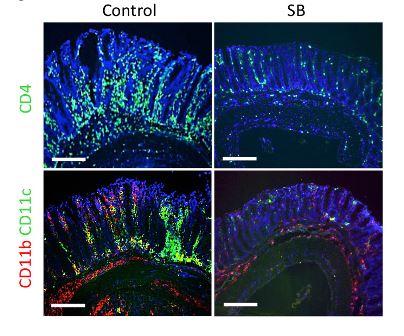New link between gut bacteria, fibre and a fatty acid could be key to treating IBD
4 December 2013
Gut bacteria that digest dietary fibre produce a fatty acid that boosts the immune system in the gut and prevents inflammation, according to research at the RIKEN Center for Integrative Medical Sciences in Japan.
Published in the journal Nature, the Japanese study shows that butyrate, a by-product of the digestion of dietary fibre by gut microbes, acts as an epigenetic switch that boosts the immune system by inducing the production of regulatory T cells in the gut. These play a major role in the body's immune response by helping fight disease and harmful substances.
Previous studies have shown that patients suffering from inflammatory bowel disease lack butyrate-producing bacteria and have lower levels of butyrate in their gut. However, butyrate’s anti-inflammatory properties were attributed to its role as main energy source for the cells lining the colon. This study is the first to provide a molecular basis for the role of butyrate on the production of regulatory T lymphocytes.
The Japanese team, lead by Dr Hiroshi Ohno from RIKEN in collaboration with the University of Tokyo and Keio University, investigated the molecular mechanisms by which commensal microbes augment the number of regulatory T cells (Treg cells) present in the colon of mice that were bred germ-free.
Their research demonstrates that butyric acid, a short-chain fatty acid produced by commensal bacteria acts on naïve T cells to promote their differentiation into Treg cells. It achieves this through epigenetic changes that regulate the expression of the genes responsible for differentiation of naïve T cells into Treg cells.
The study shows that mice suffering from colitis see their levels of Treg cells increase and their symptoms improve after administration of butyrate as part of their diet.

In a mouse model for colitis, a diet
supplemented with butyric acid
leads to decreased infiltration of
inflammatory cells, Credit: RIKEN
“Regulatory T cells are important for the containment of excessive inflammatory responses as well as autoimmune disorders. Therefore these findings could be applicable for the prevention and treatment of inflammatory bowel disease (IBD), allergy and autoimmune disease,” said Dr Hiroshi Ohno.
“Butyrate is natural and safe as a therapy and in addition to that it is cheap, which could reduce costs for both patients and society,” Dr Ohno added.